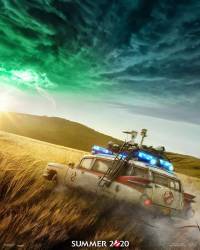
Plot hole: The whole premise of the movie is that history would write off the existence of the Ghostbusters after the events of the first movie. In that movie there was prolonged large scale destruction in the heart of a city with millions of inhabitants. It's simply impossible that people would forget or dismiss it. And that's if we do not even begin to assume that the second one happened, even if the director said it did; nothing in his movie shows that, and for a good reason (Statue of Liberty, anyone?).
Suggested correction: There's nothing in the movie to indicate that people in general have "forgotten" or "dismissed" the existence of the Ghostbusters, nor is that the "whole premise" of the movie. The fact the teacher is a fanboy and that the characters literally watch old news-clips and commercials for the Ghostbusters kind of goes against this. People simply just stopped talking about them because they did their jobs too well and went out of business 30 years prior... they were no longer relevant. I mean, if you want a real-world-analogue, just look at 9/11. It was a massive, generation-defining event, and yet outside of brief memorials once a year (which honestly, fewer and fewer people seem to pay attention to every year), people basically don't talk about it at all anymore. The only characters in the movie that don't believe in ghosts/the Ghostbusters at first are the kids. And their mother has been purposely sheltering them because she hates their grandfather-a Ghostbuster. So it makes sense they wouldn't necessarily know about them.
9/11 was a different kind of event; it didn't have 4 easy to remember heroes who already were on magazines covers all over the world and while it certainly dropped off the radar in many ways, some consequences in the long term have been permanent and it is in the history books. Here the world had proof that there are other dimensions, the dead, etc, and years later the Ghostbusters are relegated to a few youtube videos with a few thousand views (that with Peter supposedly teaching advertising and promotion, even). I didn't mention the kids, although the movie itself knows it's absurd that Podcast does not know anything about it and there's a joke about it. I understand if someone makes a point about the movie taking an ample creative license for the sake of not having to deal with 'realistic' implications of its comedic prequels since it wouldn't service the kind of story it wants to tell here, but I am surprised you say that the Ghostbusters here are not forgotten or dismissed. Somehow they are so fringe that not even the conspiracy theory guy knows about them, and the teacher knows because they are a childhood memory.
Like Ray tells a young Jason Reitman in Ghostbusters II, "Well some people have trouble believing in the paranormal." The public would have even less of a reason to believe in or think about the Ghostbusters since there were no Ghost sightings in thirty years. Not to mention the fact that men walked on the moon six times between 1969 and 1972 and astronauts were viewed as heroes, but we haven't visited the moon in fifty years, and astronauts are no longer regarded as heroes.
We keep conducting research in the field sending people in space when and where necessary and people are well aware that astronauts exist, even if they declined in popularity. It's not random obscure knowledge you can get only if you are looking specifically for it on some Youtube channel that a science nut and a conspiration theorist never heard of before. And we are again comparing something that does not have the same impact it would have to learn that dead people still walk (so to speak) the Earth. BTW, I am not sure (but I could be wrong here and please correct me) that the movie says that there have been 'no' ghost sightings at all; Ray said that they received less calls, not enough to pay their bills, not that ghosts disappeared entirely. It's just that in the Ghostbusters universe, people are kinda jaded about everything, which worked when the movies were comedies and you could say it was obvious paradox and satire that they would save the planet and still get sued once they weren't relevant anymore.
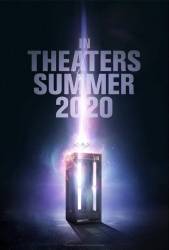
Plot hole: At the end, everyone was returned to their own timeline. Except for Ted's dad. He's shown still playing till the end and not disappearing like the others. However, this version of Ted's dad came from the future when he attempted to arrest his son at David Grohl's house. Therefore, he should have disappeared with the others and returned to his future timeline.
Suggested correction: That's not what happened at the end at all. Only those whose were time-displaced returned to their own timeline. Which is why we see Kid Cudi leave, he was time-displaced and not picked up in the time machine. You can even see Ling Lun is still playing.
Incorrect. Ted's dad was time displaced as well. He never arrived by the time machine, but was sent to hell after being killed by Dennis. Therefore, he should have been sent back to his future timeline.
Ted's dad was never time-displaced, nor did I say he arrived by time-machine. He was sent to Hell in his own time line and then went with the group to 2020. Unlike Kid Cudi who was time-displaced because he popped out of his own timeline because of time and space collapsing. Just being from a different time isn't what time-displaced meant.
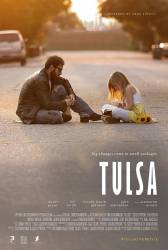
Plot hole: Social Services requires even emergency placements to be approved. A child (9-year-old Tulsa) who had never seen her father (but "just knew" the man in the photo with her mother was her biological father) would not be allowed to stay with a man who did not even know he had a daughter. Social Services would not assume the child was correct or leave the child with a non-approved "stranger." Tommy's apartment - trashed and scattered with beer cans and bottles of alcohol - would be a big red flag. (00:03:55 - 00:12:00)
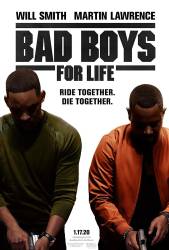
Plot hole: Isabel's escape can happen just because it's off-screen. For it to happen, it's critical that every single guard (minus the one she kills) is inside the monitors' room, but not a single one stays behind, because it needs that no guard can see what is happening, in person or remotely. No amount of other blindly loyal fellow prisoners who are staying behind can cover not only her fully switching her clothes, but also transporting the body (who was dressed up in full, even if there was no need for that) from the middle of the room to the nearest washing machine. It also needs the paramedics to completely bail out of doing their job; she is not Hannibal Lecter, she is not wearing the face of her victim, she has just some blood smeared on her and superficial cuts.
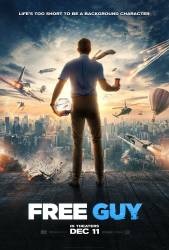
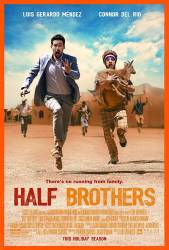
Suggested correction: As one of the principal developers of the simulation engine, Millie recognizes that Guy is a non-player character (NPC) who merely obeys a loop of coded actions, and he's supposedly incapable of acting outside of his code. So, she means that NPCs can't just arbitrarily kiss players. Players can do whatever they want, but NPCs are mindless robots. At that point, however, she doesn't realise that Guy's Artificial Intelligence has evolved to independent self-awareness, allowing him to act outside of his code.
Charles Austin Miller
Key's actually says "There isn't a button for that" when Millie brings it up. There would be no way for her to initiate, as her in game actions would be limited to the controls offered.
By the time Millie kisses Guy, we know that the Free City simulation engine was already undergoing Artificial Intelligence evolution, essentially rewriting its own code, allowing Guy (and other NPCs) to achieve independent self-awareness. It follows that Free City was probably rewriting its player code, as well, making all sorts of new and startling functions possible for players and NPCs alike.
Charles Austin Miller